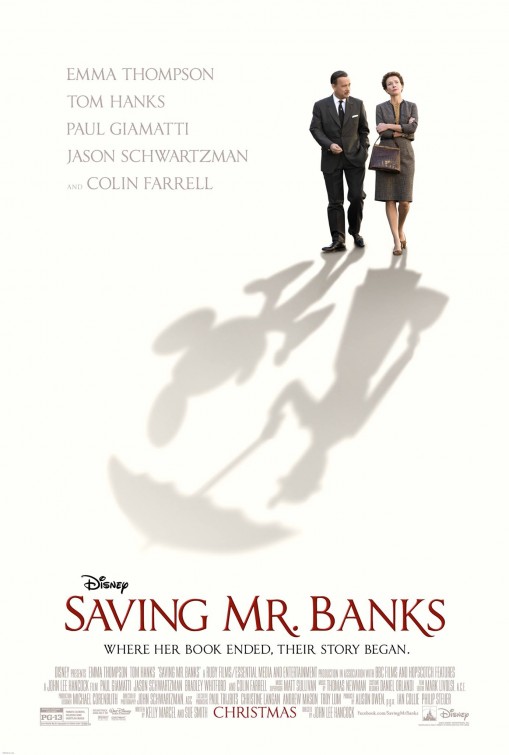Where Her Book Ended, Their Story Began
Director
John Lee Hancock
Starring
Tom Hanks
Emma Thompson
Colin Farrell
There is a misconception among creative types that the story surrounding how iconic or beloved tales were created is sometimes just as interesting or important as the finished release itself. On occasion, this can be true. Finding Neverland, for instance, is a charming reassessment of something incredibly familiar. But as stated, this ‘backstage’ mentality is a misconception. The subtle in-jokes and frustrations that go into making a movie are almost always lost on your garden variety audience and any suspense or tension is completely eradicated by the fact that we all know the final product will be completed and a roaring success. This particular analysis focuses on the cinematic adaptation of P.L. Travers’ [Thompson] Mary Poppins books. The narrative is split between life in rural Australia, 1906 and 1961 Los Angeles, detailing Travers’ childhood and her stubborn refusal to simply hand over the rights to Walt Disney [Hanks] and his studio. All of which can be quickly summarised by explaining that her father (played by Colin Farrell) was a loving man but a terrible alcoholic who had difficulty holding down a job and the author’s initially acceptable changes to the script grow increasingly out of hand to the extent that she finally demands that absolutely no red must be seen in the film, as she has “gone off the colour red but can’t understand why.” That’s pretty much it, rinsed and repeated for a solid two hours. But will the film ever be made? Will it be a musical? Will Dick Van Dyke play the loveable chimney sweep? Will it contain animated segments? Oh, who could know? Well, we do. It does. The end.
Reviewing biopics and documentaries isn’t my strong suit. When penning your critique, it often feels like you are chastising the subject matter, rather than how they have been presented by the movie industry. This film is one of those extreme rarities that is the exact opposite. Hanks, Thompson and Farrell are not only incredibly well cast but they manage to bring an exceptional amount of personality to an otherwise bland premise. But from the brief excerpts of real recordings, we are left with the impression that Travers was a contradictory curmudgeon of a beast who was thoroughly unreasonable from start to end, rather than being a complex individual who has suffered a hard life and created a stony persona from it. After all, there’s a distinct difference between protecting one’s creation and plain rudeness and without any charisma or charm, Travers’ plight is lost on us. Then there are the supporting roles, which are completely dull, two dimensional and criminally unexplored. There’s the continually upbeat driver, Ralph [Paul Giamatti]; Don DaGradi [Bradley Whitford], Richard Sherman [Jason Schwartzman] and Robert Sherman [B.J. Novak], who are given the unenviable task of negotiating the script daily to come to some sort of compromise; Travers’ mother Margaret Goff [Ruth Wilson] who does her best to raise three young girls in the outback of Allora and young Travers herself [Annie Rose Buckley] who is expected to just stare solemnly as her father slips into.. well.. it’s never explained but it’s cinema alcoholism: lots of sweating, falling over and coughing up tiny spatterings of blood before a quiet death.
The film is a marvel in technological mediocrity. The directing, the cinematography, the editing, the score, everything is just so delightfully acceptable. But when you realise this is from the director of The Alamo and The Blind Side, it makes perfect sense. John Lee Hancock is known for his ability to present an unadventurous made-for-TV tale but somehow convince talented people to give impressive performances, elevating his drably shot stories. Having said that, he has the support and power of the Disney studios behind him and as such, the production design and attention to detail are superb. Both the scenes set in turn of the century Australia and sixties Los Angeles really live and breathe the respective era. Having said that, looking at the Australian scenes, I would assume it was all shot in LA but whatever, it looked the part.
In my opinion, this really isn’t a good film to release in a time of creative and economic hardship. I never side with the corporate magnate. Who does? Who wants to see the big successful company succeed? But when you cast Tom Hanks as Walt Disney and have him expand on his philosophy as a creative individual, it changes everything. Phrases such as “You think I’ve made an empire and I want Mary Poppins to simply be another brick in the wall” “I know where she’s coming from, I’ve been there myself. That mouse is family” and “I made a promise to my girls that I would make this movie .. you have to share Mary Poppins with the world” convince you that this isn’t just a money-grubbing mogul but a passionate creator who understands and loves the source material. Now, how much of that is actually true or not is not for me to say but what’s presented in the film does not lend itself to support Mrs. Travers’ case; if anything, this woman’s cantankerous and stubborn refusal makes her the film’s antagonist.
Will Saving Mr. Banks do well? Almost certainly. Critics will lavish it with praise, studios will push for nominations in every respected award and the public that actually see it will eat up the heavy handed emotional elements gleefully. But is it any good? Not at all.
Release Date:
29th November 2013
The Scene To Look Out For:
Mrs. Travers’ ever chirpy, well-mannered driver, Ralph, is just as dull as the rest of the supporting cast but when we are given the briefest of glimpses into his life, he becomes a fascinating individual. A hardworking man with no friends or family ever mentioned, other than his disabled daughter, explaining that he revels in a beautiful day because it means his daughter can sit outside while he’s at work, rather than cooped up indoors all day. And how does the abrasive Mrs. Travers respond? She lists successful individuals who overcame great odds to become great, echoed with a pompous and thoroughly arrogant “your daughter can do anything she wants.” It should be a heart-warming moment but it’s really not. It’s an incredibly condescending and trite remark made by someone who has absolutely no idea what Ralph’s daughter is suffering from. Optimistic, of course but patronising nevertheless.
Notable Characters:
As wonderfully crafted as Thompson’s performance is, I can’t highlight it as the actual life of P.L. Travers is one of great strife and determination as an author and journalist, set in Australia, London and New York. The story of how this woman came to be and the various unanswered questions about her evolution from a carefree young girl to a crotchety old git is disappointingly absent. Tom Hanks’ portrayal of Walt Disney (the first time Disney has featured as a main character on film), on the other hand, treads a fine line of brilliant idolatry and malevolence. At the same time, he’s a charming old man, a father and genuinely interested in bringing happiness to others. Yet within him is the ability to be relentless, manipulative and mercilessly shrewd. A fascinating study, masterfully duplicated and one which is all too brief.
Highlighted Quote:
“We share a Celtic soul you and I. The whole world, it’s just an illusion, Ginty, old girl”
In A Few Words:
“Despite what industry professionals or nostalgia riddled reviewers will say, Saving Mr. Banks is a very weak and thin story saved only by thoroughly impressive lead performances”
Total Score: 2/5
![The Red Right Hand Movie Reviews [Matthew Stogdon]](https://reviews.theredrighthand.co.uk/wp-content/uploads/2021/12/cropped-header1.png)




